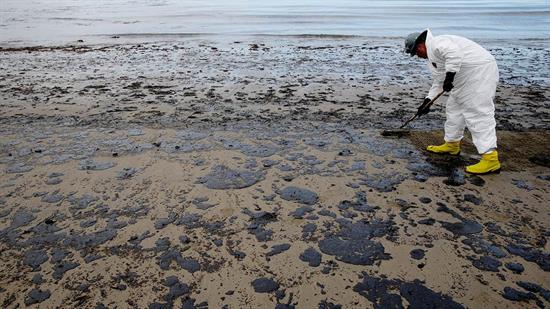Carbajal and Feinstein Press PHMSA on Pipeline Safety Rulemaking Delay
Washington,
May 17, 2018
Tags:
Environment and Energy
Washington, DC – Today, Rep. Salud Carbajal (CA-24) and Senator Dianne Feinstein (D-CA) requested that the Pipeline Hazardous Materials Safety Administration (PHMSA) provide an explanation as to why the agency has failed to enact several long overdue gas and hazardous liquid pipeline safety improvements. The Department of Transportation’s (DOT) Inspector General found that as of October 2016, PHMSA has failed to implement 20 of 81 directives required by law, including eight pipeline safety rulemaking mandates in the Pipeline Safety, Regulatory Certainty, and Job Creation Act of 2011 (P.L 112-90). “It is unacceptable that seven years after these measures were signed into law, a number of critical overdue pipeline safety rules passed by Congress remain unenforced,” the Members wrote. “We know that oil spills will continue to happen as long as we continue to rely fossil fuels for our energy security. PHMSA has an obligation to initiate rulemaking to implement these common-sense safety standards to mitigate these risks. We cannot continue to wait for another catastrophe to occur for PHMSA to take action.” In May of 2015, pipeline Line 901’s failure resulted in more than 100,000 gallons of crude oil spilled along the Gaviota Coast in California. Last September, the House unanimously passed Carbajal’s amendment to the FY18 Transportation, Housing and Urban Development Appropriations bill, requiring updated automatic shutoff valves and leak detection standards for oil and gas pipelines. The amendment set aside $1 million of PHMSA's budget for the finalization and implementation of section 4 and section 8 of the bipartisan 2011 pipeline safety law. Ultimately, the legislation was not adopted in the FY18 Omnibus Appropriations package. Read the full letter here or below:
The Honorable Elaine L. Chao The Honorable Howard “Skip” Elliot Secretary Administrator U.S. Department of Transportation Pipeline and Hazardous Material Safety Administration 1200 New Jersey Avenue, S.E. 1200 New Jersey Avenue, S.E Washington, D.C. 20590 Washington, D.C. 20590
Dear Secretary Chao and Administrator Elliot: We are writing today to request an update on the implementation of the Pipeline Safety, Regulatory Certainty, and Job Creation Act of 2011 (P.L 112-90, hereafter “Pipeline Safety Act of 2011”) and urge you to prioritize finalizing critical pipeline safety rules. The Pipeline and Hazardous Material Safety Administration (PHMSA) is charged with overseeing over 2.6 million miles of pipelines transporting natural gas, oil and hazardous liquid across the United States. However, PHMSA has languished in promulgating and enforcing many safety standards as mandated by Congress. On October 18, 2016, the Department of Transportation’s Inspector General released a report, which found that PHMSA has failed to implement 20 of 81 directives required by law, including eight pipeline safety rulemaking mandates from the Pipeline Safety Act of 2011. Today, nearly six and a half years after the enactment of the Pipeline Safety Act of 2011, rulemakings related to leak detection, emergency shutoff valves, and public education and awareness are still not finalized. The May 19, 2015 Refugio oil spill, off Santa Barbara County, that spilled over 100,000 gallons of crude oil into our oceans and shut down commercial fisheries, raises questions about PHMSA’s ability to enforce proper oversight of our nation’s pipeline safety laws. In 2011, Congress worked in a bipartisan way to pass the Pipeline Safety, Regulatory Certainty, and Job Creation Act. This law directed PHMSA to update and strengthen key pipeline safety standards. The law called on PHMSA to issue a rule requiring the installation of automatic and remote-control shutoff valves and leak detection technology after PHMSA and its predecessor agency, the Research and Special Program Agency (RSPA) failed to adopt safety recommendations issued from the National Transportation Safety Board (NTSB) more than 20 years ago. In 1995, after investigating the Texas Eastern Transmission Corporation (TETCO) pipeline explosion, in which 1,500 local residents were evacuated after escaped natural gas ignited and sent flames 400 feet into the air, the NTSB recommended that the RSPA “expedite requirements for installing automatic – or remote-operated mainline valves on high-pressure pipelines in urban and environmentally sensitive areas to provide for rapid shutdown of failed pipeline segments.” While an automatic shutoff valve may not stop an oil spill from happening, it can mitigate some of the damage on our communities. During the 2015 Refugio oil spill, it took operators over two hours to find the source of the burst. We know that oil spills will continue to happen as long as we continue to rely on fossil fuels for our energy security. PHMSA has an obligation to initiate rulemaking to implement these common-sense safety standards to mitigate these risks. We cannot continue to wait for another catastrophe to occur for PHMSA to take action. We ask that you provide an update on outstanding actions required by the Pipeline Safety Act of 2011 and present a timeframe for when PHMSA will finalize these standards. Sincerely, SALUD O. CARBAJAL DIANNE FEINSTEIN Member of Congress United States Senator
### |
- Home
- About
- Services
- Help with a Federal Agency
- Congressional Art Competition
- Congressional App Challenge
- Congressional Commendations
- Congressional Women of the Year
- Flag Request
- FY2027 Appropriations Requests
- FY2027 National Defense Authorization Act Requests
- FY26 Community Projects
- Know your Immigration Rights
- Grants
- Internships
- Military Academy Nominations
- Tour Requests
- Issues
- Media
- Contact



